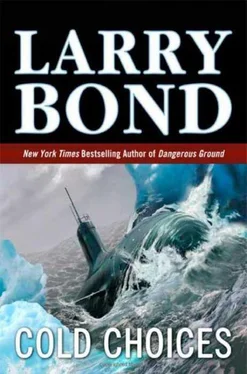AS-34 dropped faster and faster. They needed to reach the bottom quickly, to avoid wasting time and precious battery power. But they needed the motors to slow their descent. Using them too soon wasted time, using them too late would be disaster for them and Severodvinsk.
“Time for the sonar,” Umansky announced. To save energy, he’d left even that vital sensor off. Turning it on now held some risk. A fault could only be corrected on the surface. If it didn’t work properly, their dive was wasted.
But it did work, and showed their goal within easy reach. “Recommend course two three one to bring us to their starboard side, three hundred meters.
Bakhorin nursed the horizontal thrusters while he watched depth gauge unwind. Normally, by now he’d be braking, but it was better to wait. One short, powerful burst from the motors took less time and less power than a slow descent. Still, Bakhorin wished he’d checked the figures one more time. They could only do this once.
“Begin braking in five, four, three, two. now.” Umansky’s calm tone held no urgency, but Bakhorin was tense enough for both of them. They’d allowed for the uneven bottom in their calculations. He hoped it was enough.
Bakhorin dumped ballast and hit the motors. He tried to forget about the several hundred kilos of fused explosives that hung in baskets just under his nose.
Umansky had also calculated how long the motors would be needed to stop their descent. He called out the seconds while Bakhorin watched the depth gauge, his hand hovering over the controls.
Umansky called out as the depth gauge nudged one hundred and ninety meters. AS-34 came to a stop with seven meters under the keel and Severodvinsk’s port bow thirteen meters dead ahead.
“Let’s hope the rest of this mission goes as smoothly,” Bakhorin prayed. He then turned the minisub toward the first rock outcropping.
Olga Sadilenko’s apartment
Olga Sadilenko hardly knew what to think when she looked at the first image. The colors were all wrong, like a misadjusted television. The shapes were jagged at the edges, but the center shape could only be a submarine. It looked like the photographs she’d seen of Severodvinsk, although they were of a surfaced sub at a pier, with smiling sailors lining her deck. Some of the other images looked more reasonable, but they covered only small sections of the submarine. A number of the photos showed the true extent of the damage.
“The Americans sent us these pictures?”
“A Skynews reporter,” Irina replied. “He’s British, but he’s aboard Churchill. I’m sure he must have received them from the Americans. They gave him a lot of information. There are maps of the bottom where the sub is located and images taken from many different angles.
“Some are sonar photographs taken by an underwater robot and printed out by a computer. The different colors on the maps show what the underlying substance is: rock, mud, or sand. The contour lines show the depth in three-meter increments. The others are high-definition digital photography.”
Irina flipped a few pages over, moving further down the stack. “Look at these pictures. They show the damage to the hull.”
Olga took one of the pictures from Irina. In spite of the small field of view, she could clearly see how the metal of Severodvinsk’s bow was ripped and dished in. She thought of her little Yakov and struggled not to cry.
The Americans had finally responded to their pleas for information on casualties, and her son was listed as one of the injured. No specific details, just that his injuries weren’t considered life-threatening. Praise God! Unfortunately, eighteen families had received the worst possible news — their menfolk were dead. Many tears had been showered upon Olga’s floor. Many lives had been forever ruined, including several young girls with small children or a child not yet born. She felt powerless and frustrated that she could not relieve them of their sorrow and pain. She remembered her own grief when her husband fell overboard during a storm and was lost at sea. Yakov was only three then.
And yet, there still had been no word from the Russian Navy. Nothing but silent indifference.
She almost hugged the page, then wanted to hug the Americans; may God bless them. “But why did they do this?” she asked.
Irina answered, “The reporter didn’t say why. In the email, he just said it was ‘useful information, describing Severodvinsk’ s exact status.’ He said it’s not secret. The Americans want to give it to our Navy, to help in the rescue.”
Olga Sadilenko smiled. “And that’s why they gave them to us. Our Navy hasn’t seen these images.”
Irina shrugged. “Maybe they don’t need them.”
“Maybe they don’t, maybe they do. I believe they haven’t seen them because they don’t want to. It would mean giving the Americans some credit for helping.”
“Olga, do you believe our admirals would do that? That they would intentionally ignore foreign help just because it would make them look bad?” Irina’s shocked expression showed her naïveté.
Chuckling cynically, Olga took hold of the young woman’s hand and said, “Oh yes, child, I do. Are you willing to wager our men’s lives on the judgment of those pompous toads in headquarters?” Olga paused, considering. “Can these pictures be added to your web page? Will they fit?”
“Yes,” Irina smiled. “We have plenty of room.”
“And can we make more copies of these?” She held up the photos.
Irina nodded.
“Then make many copies. Send them to everyone we know, including all those news organizations.”
“I’ve already done that, electronically, and two of our women are working on the website right now. They’ll be done in less than an hour.”
“Can you send email back to this reporter?”
“Of course.”
“Then I have some questions for him — or his friends.”
Vice Admiral Kokurin’s office, Northern Fleet Headquarters, Severomorsk
“We can’t shut them down, Admiral. The server hosting their site is located in Germany. And we can’t cut the phone lines to a hundred families. and their friends. and every public telephone in Severomorsk.”
Admiral Babyarin was trying to calm the Northern Fleet commander. Kokurin had exploded when the latest addition to the Wives and Mothers website had crossed his desk.
Kokurin stared at the images. “Could these images be faked, a clever deception?”
“Our experts are examining them right now. They are consistent with what Admiral Vidchenko has told us, and are consistent with what a good imaging sonar and underwater cameras can produce.”
“So, how did those civilians obtain this data? From the Americans?”
“According to the website, from a reporter connected to the Americans, but yes, it had to be leaked by them.”
“Are they doing this to taunt us? It’s like looking at a corpse.” Kokurin’s heart turned to lead when he looked at the images. Their newest, their best atomic submarine was lost, now a tomb for eighteen sailors and a prison for sixty-seven more.
Babyarin shrugged. “They may be trying to set up some sort of defense for their actions. With Vidchenko so close to rescuing the crew, they want to get these images into the media. They may not have been faked, but they could still have been altered.”
Kokurin sat quietly. Babyarin didn’t like his expression, and finally asked, “What does Vidchenko say?”
“I haven’t asked him. He’s too busy rescuing our men to distract him with this business.”
“But has he seen the images?” Babyarin pressed.
“It doesn’t matter. Petrov and his men could be on the surface in an hour.”
Читать дальше












